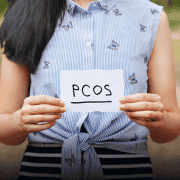How Plant-Based Diets Help To Tackle PCOS

Women with PCOS can utilize a healthy diet and lifestyle as the golden tools to effectively manage PCOS symptoms. One of the major causes of PCOS is insulin resistance which is a condition where cells are unable to utilize glucose as a source of energy. Normally, this uptake is regulated by insulin which due to insulin resistance is unable to do its job properly. This failure deceives our body to assume that it needs to produce more insulin so cells are able to function effectively.
Higher insulin production leads to higher testosterone production by the ovaries causing PCOS symptoms like acne and unwanted hair growth on the face, back, and chest.
An unhealthy diet can further impact the effect of insulin resistance, which is why it is important for us to improve our diet and be consistent.
How can Plant-based diets for PCOS/PCOD help?
Plant foods are abundantly rich in Vitamin B6, Vitamin C, folate, beta-carotene, phosphorus, magnesium, and potassium which help improve your immunity. These offer anti-inflammatory benefits and manage insulin resistance, improve the gut microbiome and decrease the risk of heart diseases!
A plant-based PCOS diet essentially includes fruits, vegetables, nuts, seeds, and legumes. PCOS diet plan for women could include high fiber foods like broccoli, beans and lentils, lettuce, cauliflower, almonds, berries, sweet potatoes, and pumpkin.
A high-fiber diet is also an ideal PCOS treatment diet as it slows down the digestion process so your body takes a longer time to absorb sugar from the foods you consume. This prevents surges in blood sugar and insulin levels.
Popular foods that help reduce inflammation include vegetables like tomatoes, spinach, olive oil, kale, and fruits like strawberries.
What foods to avoid with PCOS?
Highly processed foods that have high carbohydrate content and low fiber are some foods to avoid with PCOS. These include foods such as white flour pasta noodles and semolina as they can increase inflammation and could affect insulin resistance.
Consumption of beverages with high sugar content, fries, and red & processed meats should also be reduced.
1. Seed cycling
Seed cycling is a process of seed supplementation with 4 different seeds namely Pumpkin, Flax, Sunflower, and Sesame that are taken during the 2 main phases of the menstrual cycle. These are loaded with nutrients that help in balancing our estrogen and progesterone levels.
Our menstrual cycle is divided into 2 main parts :
– Follicular phase, begins on the first day of menstruation and lasts till the 14th day
– Luteal phase, begins after ovulation and lasts till the start of the next period.
Ideally, women have high estrogen levels in the follicular phase and high progesterone levels in the luteal phase of the menstrual cycle. This is when hormonal imbalances arise and the natural flow is disturbed, leading to problems like irregular periods and PCOS.
2. Seed cycling in the Follicular Phase
During this phase, you can consume 1 tablespoon of raw ground pumpkin and flax seeds every day starting from Day 1 of your period to Day 14 which is ovulation day. Pumpkin seeds promote progesterone production while flax seeds regulate estrogen levels in our body.
3. Seed cycling in the Luteal Phase
In this phase, you can consume 1 tablespoon of raw ground sunflower and sesame seeds every day until you have your next period. Sesame seeds block excess estrogen and sunflower seeds detoxify hormones in the liver.
At PlixLife, we offer free consultations, and a personalized PCOS diet plan to lose weight and manage PCOS symptoms, workout recommendations that you can combine along with oral supplementation of our safe, natural PCOS supplement .














